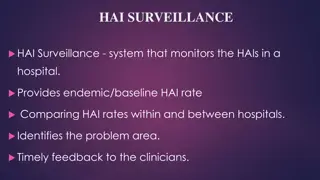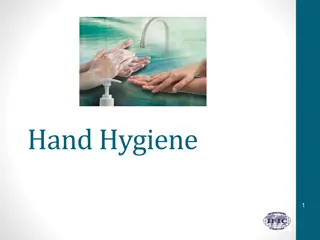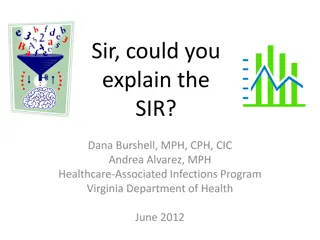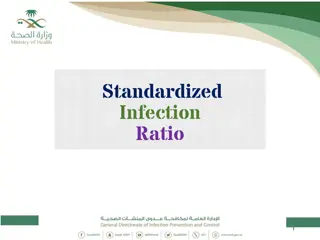Understanding Healthcare-Associated Infections and Their Impact
Explore the world of healthcare-associated infections (HAIs) through a series of informative visuals covering infection control, costs associated with HAIs, and insights into the economic burden as compared to other medical conditions. Delve into the epidemiology of HAIs and discover key aspects rel
0 views • 15 slides
Comprehensive Overview of Hospital-Acquired Infection Surveillance System
Surveillance systems like HAI surveillance play a crucial role in monitoring and managing hospital-acquired infections (HAIs) by providing baseline rates, comparing data, and identifying problem areas. This system covers various types of infections such as CAUTI, CLABSI, VAE, and SSI, with specific
0 views • 20 slides
Importance of Hand Hygiene in Infection Prevention
Hand hygiene is a crucial measure to prevent healthcare-associated infections (HAIs). This includes strategies to enhance compliance, comparison of available products, and adherence to current recommendations. The history of hand hygiene, risk factors for contamination, and the impact on infection t
0 views • 48 slides
Understanding Standardized Infection Ratio (SIR) in Healthcare-Associated Infections
The Standardized Infection Ratio (SIR) is a key measure used to monitor healthcare-associated infections (HAIs) at different levels. It compares observed HAIs with predicted values based on specific risk factors. An SIR > 1 indicates more infections than predicted, an SIR = 1 means observed equals p
0 views • 19 slides
Understanding Standardized Infection Ratio (SIR) in Healthcare
The Standardized Infection Ratio (SIR) is a crucial metric used to monitor Healthcare-Associated Infections (HAIs) at various levels. It allows for improved risk adjustment and comparison by providing a single summary number. Standardization methods like direct and indirect standardization help in a
0 views • 44 slides
Importance of Hand Hygiene in Infection Prevention
Hand hygiene is crucial in preventing the spread of infections, especially in healthcare settings where patients are vulnerable. Lack of proper hand hygiene can lead to Hospital Acquired Infections (HAIs), adding significant costs to healthcare and posing serious risks to patients. It is essential t
0 views • 19 slides





